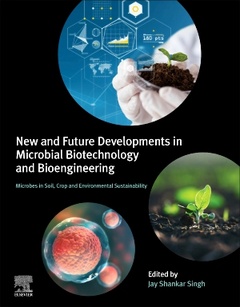Description
New and Future Developments in Microbial Biotechnology and Bioengineering
Microbes in Soil, Crop and Environmental Sustainability
Coordinator: Singh Jay Shankar
Language: English
Subject for New and Future Developments in Microbial Biotechnology...:
Keywords
agricultural productivity; Plant-bacterial interactions; Microalgae; Bioremediation of Wastewaters; Phycoremediation; industrial effluents; microbial bio-fertilizers; agro-environmental sustainability; rhizobacteria; secondary metabolites; medicinal plants; aromatic plants; Microbial bio-fertilizers; Trichoderma; Mycorrhizal symbiosis; Mycoremediation
386 p. · 21.4x27.6 cm · Paperback
Description
/li>Contents
/li>Biography
/li>Comment
/li>
New and Future Developments in Microbial Biotechnology and Bioengineering: Microbes in Soil, Crop and Environmental Sustainability reviews the exploitation of microbial biodiversity in soil with respect to nutrient-use efficiency, also discussing the improvement and maintenance of certain physical and chemical conditions in soil that can provide economic and environmental benefits toward agricultural sustainability. The utilization of microbes ranges from applications in biotechnology, marginal land restoration, the formulation of microbial inoculants, the enhancement of crop productivity, and the mitigation of global warming gases. Finally, various uses for microbial resources in crop disease management, bioenergy production, and income based on microbial cultivation are explored.
1. Bacterial Fertilizers for Soybean Plants: Current Status and Future Prospects 2. Plant-bacterial Interactions in Management of Plant Growth under Abiotic Stresses 3. Environmental Applications of Microalgae/Cyanobacteria 4. Plant-microbe Associations for Enhancement of Agricultural Productivity 5. Microbial Resources in Management of C Sequestration, Greenhouse Gases and BioRemediation Processes 6. Microbial Secondary Metabolites and PlantMicrobe Communications in the Rhizosphere 7. Mycorrhizal Symbiosis: An Effective Tool for Metal Bioremediation 8. Microalgae: Potential Agents for CO2 Mitigation and Bioremediation of Wastewaters 9. Sustainable Approaches for Biological Control of Mycotoxigenic Fungi and Mycotoxins in Cereals 10. PGPMs: A Future Trend for Environmental Sustainability 11. Harnessing the Soil Microbial Wealth for Enhancement of Plant Secondary Metabolites in Medicinal and Aromatic Plants 12. Role of Plant-Associated Bacteria in Phytoremediation of Trace Metals in Contaminated Soils 13. Use of Microbial Bio-Fertilizer Technology in Agro-Environmental Sustainability 14. Microbes Mediated Management of Degraded and Marginal Lands 15. Trichoderma – A New Strategy in Combating Agriculture Problems 16. Phycoremediation of Industrial Effluents Contaminated Soils 17. Microbial Services in Agro-Environmental Management 18. Rhizosphere Microbiome and Plant Probiotics 19. Role of Microbial Resources in Remediation of Persistent Organic Pollutants (POPs) 20. Microbial Approaches in Management and Restoration of Marginal Lands 21. Host-endophyte cross-talk: An essential prerequisite for plant ecosystem functioning 22. Tapping soil biodiversity for enhancing resource use efficiency 23. Application of plant growth promoting rhizobacteria in remediation of pesticides contaminated stressed soil
- Highlights the developments and achievements of microbial resources and their role in the sustainable management of soil fertility and agriculture productivity
- Outlines the role of microbial resource and biotechnology in sustainability to industry, agriculture, forest and management of environment
- Provides up-to-date information on the application of microbial resources and the role of biotechnology to meet the ever increasing demand of food, soil and plant productivity management
- Outlines enhancement in productivity through interventions of microbial bio-agents and eco-friendly technology




